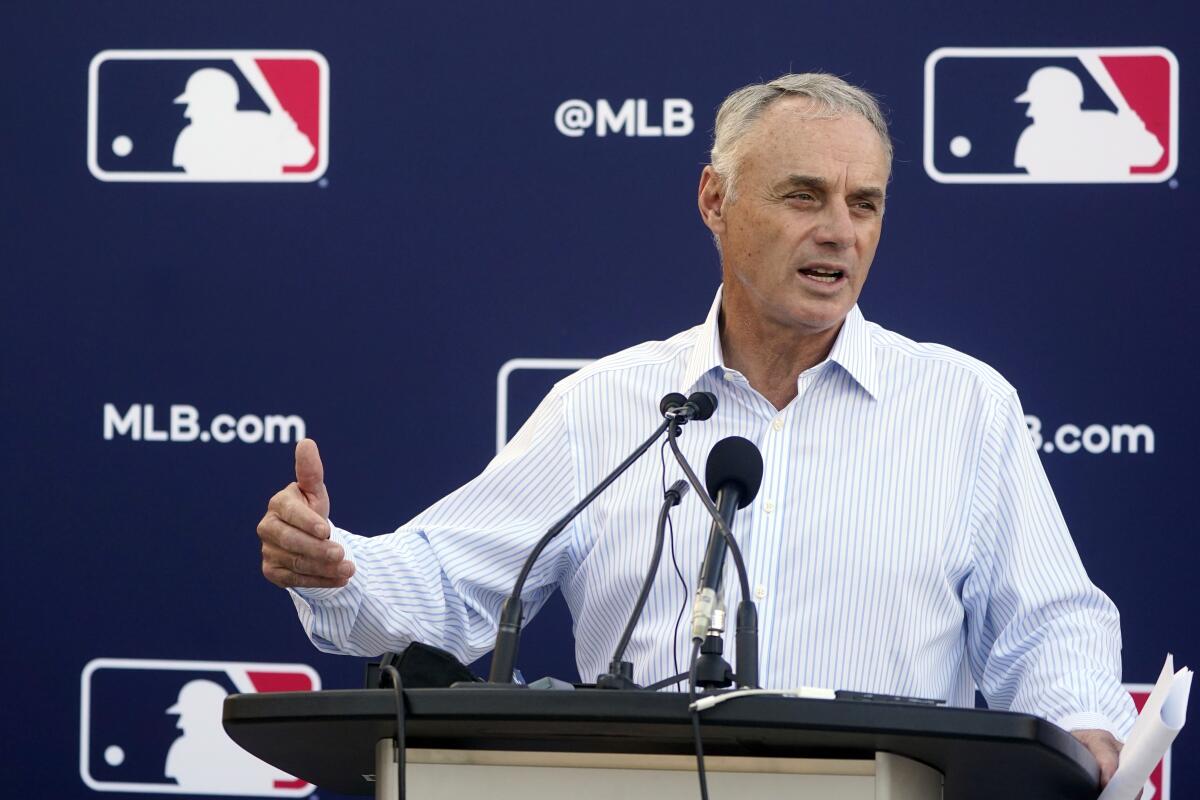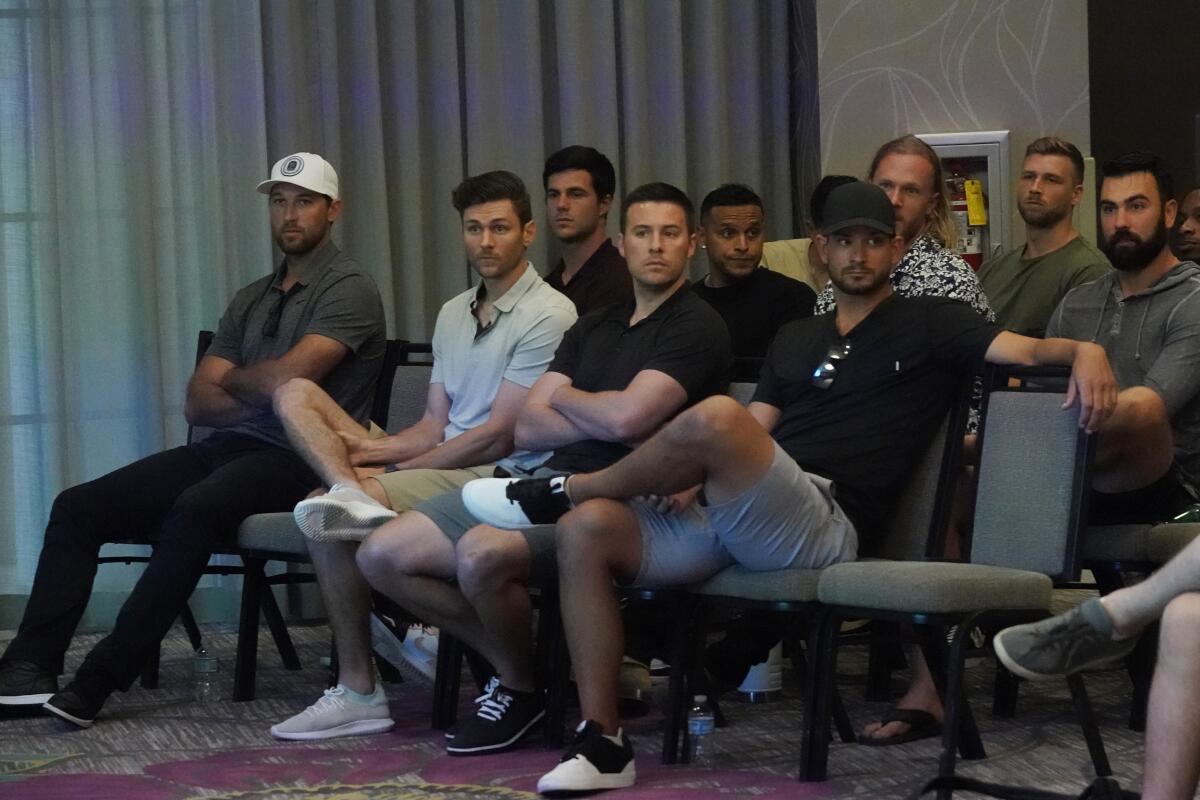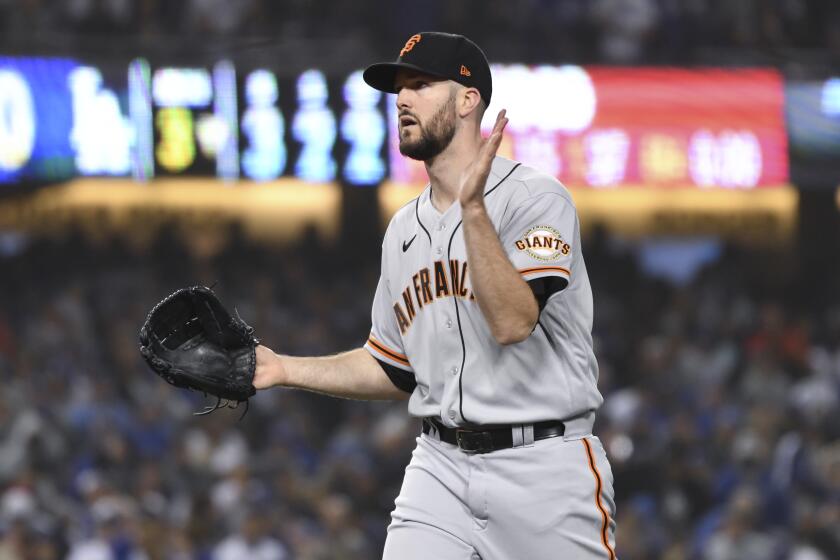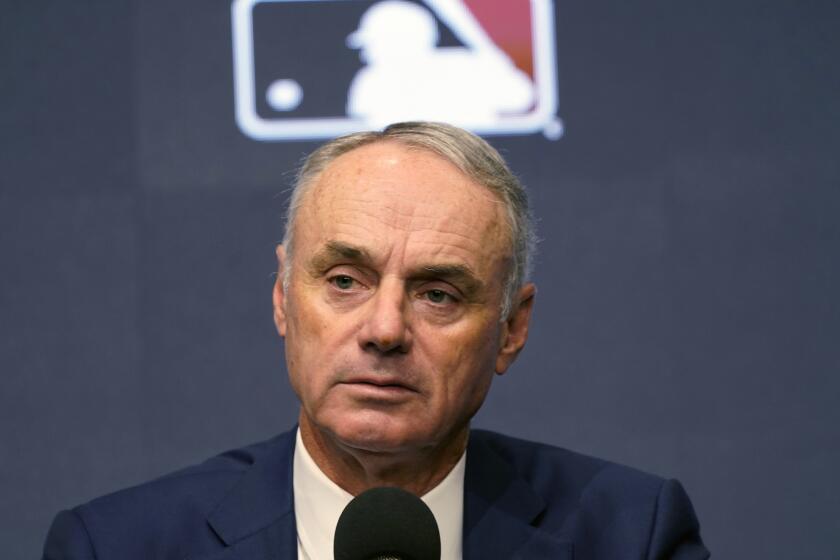Commentary: Rob Manfred canceled opening day, then spoke about it. Here’s what he should’ve said

- Share via
On Tuesday, after negotiations broke off between owners and players in Major League Baseball, and three months after owners locked out players, Commissioner Rob Manfred announced he had called off opening day. Manfred did address reporters, but this is what we would have liked to hear:
“Good afternoon. Look, I know I am not popular among fans, certainly not today. I try to be as honest as I can, sometimes brutally honest. Sometimes it doesn’t come out right. I am going to do my best to be honest with you right now.
“First, I work for the owners. The best interests of the game and the best interests of the owners are not always the same. The last time a commissioner tried to lean toward the best interests of the game, the owners fired him. I’ve got an owner who has been hoping to break the players union longer than many of the players have been alive. If I’m gone, that’s what you’re going to get.
“I know how to make a deal. But I can’t do it alone.
“Let me share a little history with you. When the players say revenues have gone up and salaries have remained flat, they’re right. Over the years, we have offered our players a guaranteed share of revenue — just like the NFL does, just like the NBA does, and just like the NHL does. That is called a salary cap. Our players do not want a salary cap. They went on strike rather than play under a salary cap.
“We respect their decision. That is why, over the last 25 years, we have figured out how to operate without a salary cap. When the players told us our teams had more than enough money among themselves to close the gap between richer teams and poorer teams, we listened. We introduced a revenue sharing system, and then we made it stronger. The Dodgers and the Yankees pay tens of millions of dollars each year, to the benefit of the Marlins and the Pirates.
Major league players turned to social media to share their feelings about the decision to cancel games. They’re not happy at all with Commissioner Rob Manfred.
“So now, when the players asked us to eliminate almost all the money shared among our teams, we said no. It was their idea for us to share a lot of money, and it was a fair one.
“Now, I want to let you in on a secret. The two words an owner loves to hear the most are not ‘World Series.’ They are ‘cost certainty.’
“Our owners are businessmen running a business. They take a risk. But we have been so successful at operating without a salary cap that we have eliminated almost all of the risk.
“When the union wanted more players eligible for salary arbitration, of course we said no. What businessman wants a third party determining his costs? When the union wanted more players eligible for free agency, we said no to that too.
“Our teams have embraced analytics, even the ones you don’t think use it. Efficiency is our motto, as every veteran cast aside for a cheaper rookie could tell you.
“The draft? We cut by half the number of players selected in the draft, and we limited what our teams can pay in bonuses. We limited what our teams can pay in bonuses for international players too.
“We told Congress we needed a law to limit what we would pay minor league players, or we would cut minor league teams. We got the law, and then we cut minor league teams anyway. We had to be publicly shamed into providing housing for minor league players.

“We have been so successful at cost containment — beyond my wildest dreams — that fans have been trained to decide whether they love or hate a trade based not on the players involved, but on whether the trade helped their team get ‘under the cap.’ Remember, we don’t even have a cap. That’s the tell: Our owners have so effectively used the luxury tax threshold as a cap that fans do not recognize the difference.
“You know who you should feel bad for today? Not me. You should feel bad for the Padres. This should be their time.
“The Padres did it right. They traded veterans for prospects, signed a ton of prospects on their own, developed the young players, then spent big in free agency when it was time to win. I have never seen San Diego so excited. When the Dodgers come into Petco Park, it feels like a rivalry. It does not feel like Dodger Stadium any more.
“You know what I hear? Complaints from other owners. Maybe not to my face, but you can tell: ‘San Diego is a small market, and the Padres are making me look bad.’ I’m looking at you in Miami, and in Pittsburgh, and in all the markets where teams happily take money from the Dodgers and Yankees without spending it on players.
“I mean, Derek Jeter is one of the greatest winners our game has ever known, and he just walked away from the Marlins. Rest assured, Derek Jeter wants to win.
“Bryce Harper is one of our marquee attractions, and he is on social media flirting with the Giants. Not the ones in San Francisco. The ones in Japan.
“If you’ve followed the negotiations this week, you’ve heard a lot of numbers. I don’t want to bore you with all the numbers. But I do want to say this: Our teams have a significant financial difference with the players over how much money a team should be allowed to spend before that luxury tax kicks in.
“That is not an issue that forces teams to spend any money. I want to be clear about that: We don’t have a salary cap, so teams can spend whatever they want. Some of the poorer teams want to keep some of the richer teams from spending, and most of the richer teams don’t mind.
“I say the luxury tax is about competitive balance because our owners have come to believe it, but let’s be honest: Our competitive balance is pretty much no better and no worse than the balance in the NFL, the NBA and the NHL. If you don’t believe me, ask fans of the Sacramento Kings.
“If the Orioles want to lose 100 games in each of the last three full seasons, and preside over the collapse of attendance in a great baseball city with a beautiful ballpark, that’s their choice. They shouldn’t try to stop the Dodgers or the Padres from spending because they do not want to spend.
Players rejected Major League Baseball’s “best and final offer” on Tuesday to end the sport’s lockout. The league said it will cancel opening day.
“We need to come up with incentives for teams to win. Our players are right about that, and our fans deserve that. We have agreed on a draft lottery as a start, and we should keep working on this.
“We stand ready to return to the bargaining table. Our fans do not need to read about me, and Tony Clark, and Dan Halem, and Bruce Meyer. Our fans need to see Shohei Ohtani, Mike Trout, Mookie Betts and Fernando Tatis Jr.
“I’m the guy who figured out how to get rid of Frank McCourt. I really can make a deal. But this is the second time in three years we have not been able to make a deal with the union, and that’s on my watch. We’ll keep working, we’ll try something different, and we’ll find a way.
“The lockout was on my watch too. I still believe it was the right call, and I had hoped I would be here today announcing an agreement. But I am not, and we ought to take responsibility for those affected by the lockout.
“I am not going to speak in platitudes. I am asking each of our teams to commit $1 million in lockout relief. I would like each team to donate half of that amount to its spring training host city. Those cities built ballparks for our teams, and they will lose tourist revenue because we are not playing there. I would like each team to donate the other half of that $1 million for a fund to assist stadium workers who will be at least temporarily unemployed, through no fault of their own.
“The Dodgers lost the All-Star game two years ago because of the pandemic. We rescheduled the game for this year, and I will not let the Dodgers lose the All-Star game again. It is time for me to get back to work, and you have my sincere word that I will not stop working until I can stand before you and say it is time to play ball.”
More to Read
Go beyond the scoreboard
Get the latest on L.A.'s teams in the daily Sports Report newsletter.
You may occasionally receive promotional content from the Los Angeles Times.













